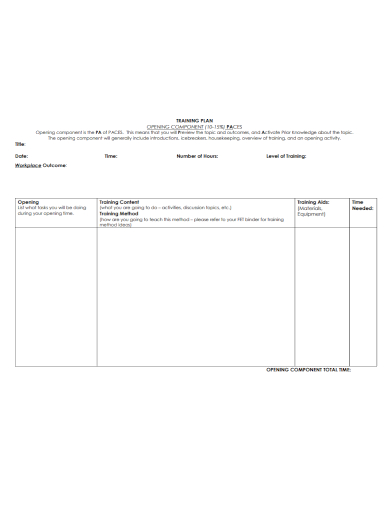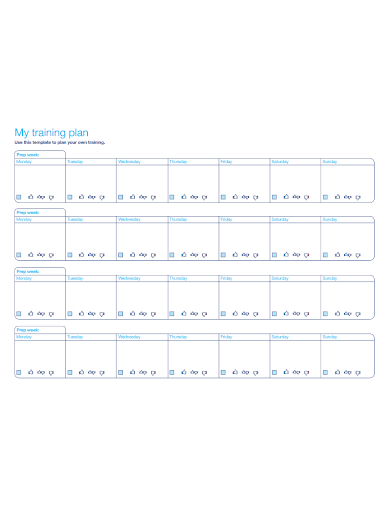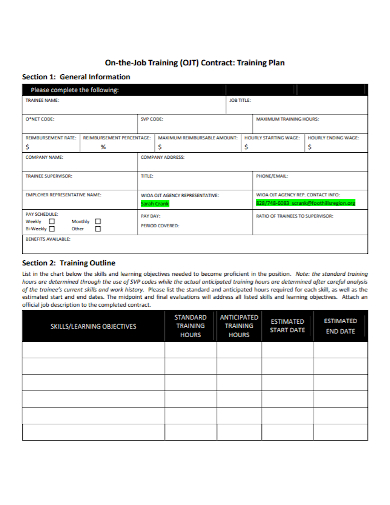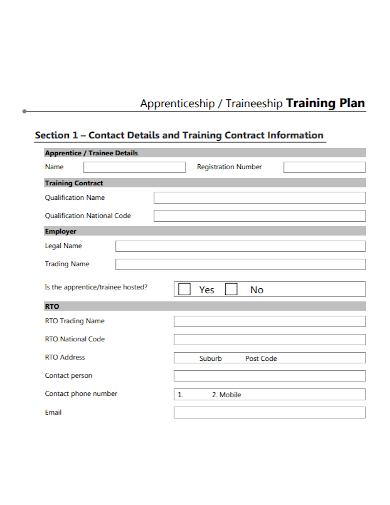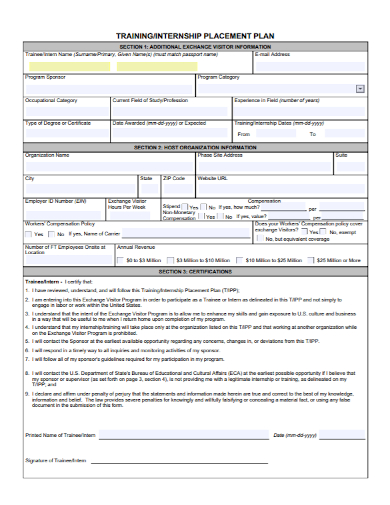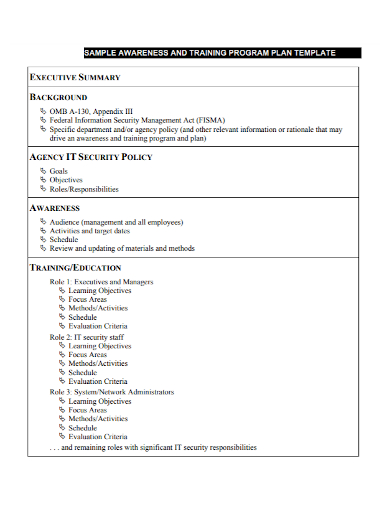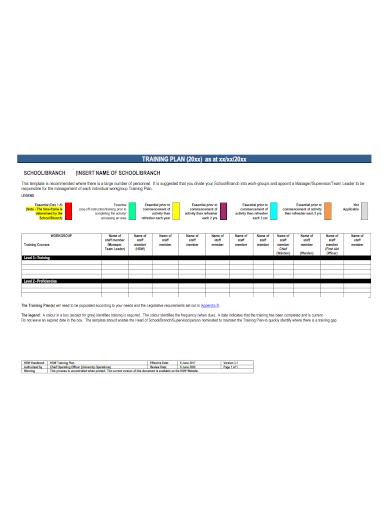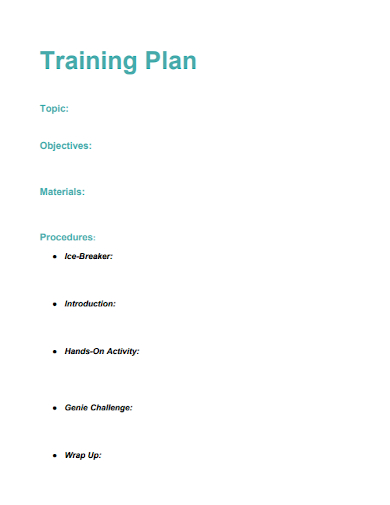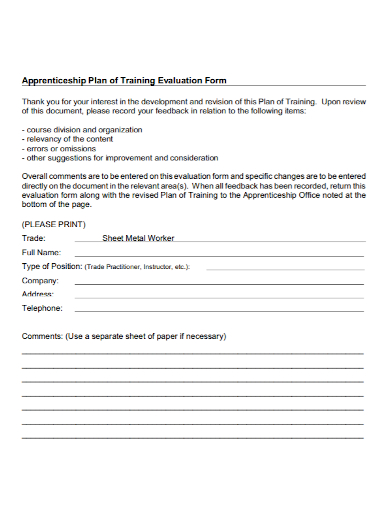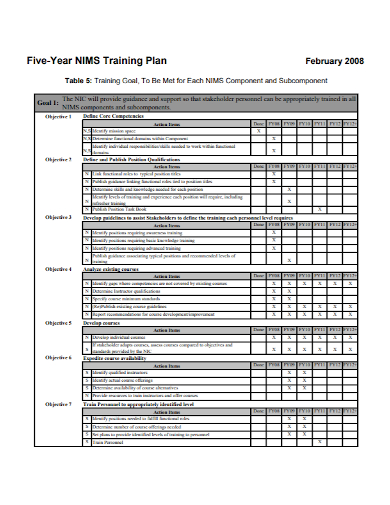Are you mulling over conducting training programs for your company to address certain issues or reach a goal? The fact that you’re considering doing training activities is one step of being a good leader of your company. Training is an important part of any employee working for a specific job of a company because it helps them be aware of the company protocols and procedures that they should observe but also enhance their skills and capabilities to do their job efficiently. But before you get to write down your plans for conducting training, do you know how to make a proper training plan that will be used as a basis to create training programs suited to the needs of your company and your employees. If you don’t know much about making a training plan yet, this article will guide you on how to make one and provide some blank training plans below to use as your samples. Keep reading the article to find out.
10+ Blank Training Plan Samples
1. Blank Training Plan Template

2. Blank Training Plan
3. Personal Blank Training Plan
4. Blank Contract Training Plan
5. Blank Apprenticeship Training Plan
6. Blank Training Placement Plan
7. Blank Training Program Plan
8. School Blank Training Plan
9. Sample Blank Training Plan
10. Blank Training Evaluation Plan
11. Five-Year Blank Training Plan
What is a Training Program?
A training program is an arduous activity implemented in companies and organizations to teach and guide their employees about their different processes and policies to adjust well into the workplace and help them learn and enhance relevant skills to improve their job performance and even give them professional growth and development needed for their future career goals.
How to Create a Training Plan
1. Assess Any Training Needs
If you’re building the training plan from scratch, you need to do an assessment on which areas should be tackled with the training programs you plan to organize. Identify and assess the needs of every employee that should be addressed with training. You can do this by letting your employees participate in surveys or self-assessment tests.
2. Set Objectives for the Training
Once you’ve identified the needs and gaps of the company through your assessment, analyze all of the information and use them as your training objectives. Your ultimate goal (as it is with the rest of the training programs anywhere) is to connect the gap between the current and desired level of knowledge or productivity of your employees address the areas where improvement is crucial through the development of a training program.
3. Create the Plan
Now it’s time to create the training plan. Make sure the training plan must include the learning theories, instructional design, content, materials, and other relevant training resources useful for the training. You must also take into consideration the level of the training program you plan to implement and the learning styles of your employees.
4. Implement the Training Programs
Once you’re done creating the plan, it’s time to implement the program. Decide how, where, and when the training should be delivered. Prepare every resource that you will be using for the training. Consider strategies for getting and retaining employee engagement. Monitor your employee’s understanding and engagement to find out if the training program is successful or not.
FAQs
What are the different types of training programs?
There are different types of training programs. Some of the well-known types are:
- Case studies: These types of training help employees learn how to act and behave in actual workplace situations. It is used in specific and complex topics that require more in-depth training.
- Coaching: This type of training is one-on-one mentoring between an employee and their mentor, such as their supervisor.
- eLearning: This consists of online courses and training materials. This is a more convenient type of training for employees especially if they work remotely.
- Group training activities: These types of training are done through collaboration and team-building with the rest of the employees.
- Hands-on training: These involve practical training conducted directly on the job.
- Instructor-led training: This training involves an instructor presenting material to employees. The topics being taught in this training are usually technical or complex topics.
- Management-specific activities: These training are focused on managerial-related activities such as brainstorming, simulations, or team-building.
What are the benefits of training employees?
Training employees is very important to help them be more efficient in their work and be more productive and motivated to carry out their tasks and responsibilities. It also helps improve the employees’ skills and help even reduce turnovers because morale is also lifted by conducting training.
Your training plan should not be set in stone instead, it should be flexible for adjustments and improvements. Since you will be closely monitoring the implemented training programs and seeing if they met your objectives, be ready to make some tweaks to the plan to make it more efficient and suited to address your objectives and goals if in case your previous plan does not meet its expectations. To help you get started making the training plan, download our free sample templates above to use as your guide!
Related Posts
FREE 7+ Fashion Business Plan Samples in PDF
FREE 10+ Sprint Planning Samples In MS Word | Google Docs | PDF
FREE 10+ Wedding Planning Samples in MS Word | Apple Pages | Powerpoint | PDF
FREE 9+ Monthly Study Planner Samples in PSD | Illustrator | InDesign | PDF
FREE 9+ Sample Curriculum Planning Templates in PDF | MS Word
FREE 10+ Teacher Development Plan Samples in MS Word | Google Docs | Apple Pages | PDF
FREE 10+ Basketball Practice Plan Samples in PDF
FREE 12+ School Business Plan Samples in PDF | MS Word | Apple Pages | Google Docs
FREE 7+ Client Strategic Plan Samples in PDF | MS Word
FREE 11+ Trucking Business Plan Templates in PDF | MS Word | Google Docs | Pages
FREE 7+ Small Hotel Business Plan Samples PDF | MS Word | Apple Pages | Google Docs
FREE 14+ Bakery Business Plans in MS Word | PDF | Google Docs | Pages
FREE 4+ Yearly Lesson Plan Samples in PDF
FREE 50+ Strategic Planning Samples in Google Docs | Pages | PDF | MS Word
FREE 10+ Construction Project Plan Samples in MS Word | Google Docs | Apple Pages | PDF

